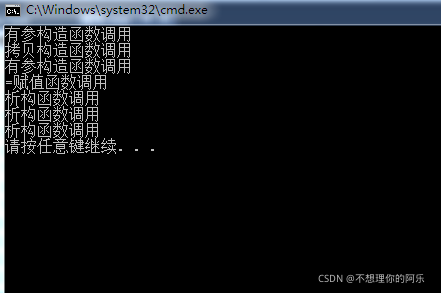案例描述: 实现一个通用的数组类,要求如下:
- 可以对内置数据类型以及自定义数据类型的数据进行存储
- 将数组中的数据存储到堆区
- 构造函数中可以传入数组的容量
- 提供对应的拷贝构造函数以及operator=防止浅拷贝问题
- 提供尾插法和尾删法对数组中的数据进行增加和删除
- 可以通过下标的方式访问数组中的元素
- 可以获取数组中当前元素个数和数组的容量
小总结:“拷贝构造” 和 "=赋值操作 " 如果遇到有在堆区开辟的数据,都会有浅拷贝的问题,要写成深拷贝避免重复释放内存。
具体写法见以下代码:
1、第一版测试代码:
myarray.hpp: 包含类模板的头文件写法
#ifndef _MYARRAY_HPP_//防止头文件重复包含
#define _MYARRAY_HPP_
#include<iostream>
#include<string>
using namespace std;
template<class T>
class MyArray
{
public:
MyArray(int Capacity)//有参构造函数
{
cout << "有参构造函数调用" << endl;
this->m_Capacity = Capacity;
this->m_Size = 0;//初始化数组中元素个数为0
this->pAddress = new T[this->m_Capacity];//开辟对应数据类型的空间
}
MyArray(const MyArray& arr)//1、自己写拷贝构造函数 防止浅拷贝问题
{
cout << "拷贝构造函数调用" << endl;
this->m_Capacity = arr.m_Capacity;
this->m_Size = arr.m_Size;
//this->pAddress = arr.pAddress;//编译器提供的,指针简单赋值,最后会导致重复释放内存
this->pAddress = new T[this->m_Capacity];//深拷贝
for (int i = 0; i < m_Size; i++)//原来数组中可能已经有数据了,所以要把数据都拷贝过来
{
this->pAddress[i] = arr.pAddress[i];
}
}
MyArray& operator=(const MyArray& myarray)//2、重载= 运算符 防止浅拷贝问题
{
cout << "=赋值函数调用" << endl;
if (this->pAddress != NULL) //先判断原来堆区是否有数据,如果有先释放
{
delete[] this->pAddress;
this->m_Capacity = 0;
this->m_Size = 0;
}
this->m_Capacity = myarray.m_Capacity;
this->m_Size = myarray.m_Size;
this->pAddress = new T[this->m_Capacity];
for (int i = 0; i < this->m_Size; i++)
{
this->pAddress[i] = myarray.pAddress[i];
}
return *this;//返回对象本身,形成链式编程
}
int getCapacity()//获取数组的容量
{
return this->m_Capacity;
}
int getSize()//获取数组的大小
{
return this->m_Size;
}
~MyArray()//析构函数
{
cout << "析构函数调用" << endl;
if (pAddress != NULL)
{
delete[] pAddress;
pAddress = NULL;
this->m_Capacity = 0;
this->m_Size = 0;
}
}
public:
T* pAddress; //指向一个堆空间,这个空间存储真正的数据,传进来什么样的数据类型,就开辟对应类型的空间
int m_Capacity;//数组容量,一共可以存储多少个数据
int m_Size; //数组中元素的个数,存完之后数组的元素个数
};
#endif // !_MYARRAY_HPP_
主cpp:
#include<iostream>
#include<string>
#include"myarray.hpp"//包含类模板头文件
using namespace std;
int main()
{
/*先简单测试一下*/
MyArray<int> arr1(10);//调用有参构造
MyArray<int> arr2(arr1);//调用拷贝构造
MyArray<int> arr3(10);//赋值操作
arr3 = arr1;
return 0;
}
现象:

2、第二版实现功能代码:
myarray.hpp :
#ifndef _MYARRAY_HPP_//防止头文件重复包含
#define _MYARRAY_HPP_
#include<iostream>
#include<string>
using namespace std;
template<class T>
class MyArray
{
public:
MyArray(int Capacity)//有参构造函数
{
this->m_Capacity = Capacity;
this->m_Size = 0;//初始化数组中元素个数为0
this->pAddress = new T[this->m_Capacity];//开辟对应数据类型的空间
}
MyArray(const MyArray& arr)//1、自己写拷贝构造函数 防止浅拷贝问题
{
if (this->pAddress != NULL) //先判断原来堆区是否有数据,如果有先释放
{
delete[] this->pAddress;
this->m_Capacity = 0;
this->m_Size = 0;
}
this->m_Capacity = arr.m_Capacity;
this->m_Size = arr.m_Size;
//this->pAddress = arr.pAddress;//编译器提供的,指针简单赋值,最后会导致重复释放内存
this->pAddress = new T[this->m_Capacity];//深拷贝
for (int i = 0; i < m_Size; i++)//原来数组中可能已经有数据了,所以要把数据都拷贝过来
{
this->pAddress[i] = arr.pAddress[i];
}
}
MyArray& operator=(const MyArray& myarray)//2、重载= 运算符 防止浅拷贝问题
{
if (this->pAddress != NULL) //先判断原来堆区是否有数据,如果有先释放
{
delete[] this->pAddress;
this->m_Capacity = 0;
this->m_Size = 0;
}
this->m_Capacity = myarray.m_Capacity;
this->m_Size = myarray.m_Size;
this->pAddress = new T[this->m_Capacity];
for (int i = 0; i < this->m_Size; i++)
{
this->pAddress[i] = myarray.pAddress[i];
}
return *this;//返回对象本身,形成链式编程
}
T& operator[](int index)//重载[]运算符,实现用下标方式访问数组 例如:arr[1]=100;
{
return this->pAddress[index]; //注意返回值的类型要为引用,即返回一个地址,它要作为左值存在,因为你可以修改他的值嘛
}
void Push_back(T& data)//尾插法 向数组中插入数据
{
//插入之前先判断一下数组是否还有空间,容量是否等于大小
if (this->m_Capacity == this->m_Size)
{
cout << "数组没有空间了" << endl;
return;
}
this->pAddress[this->m_Size] = data;//在数组末尾插入数据,即尾插
this->m_Size++;//更新数组大小
}
void Pop_back()//尾删法 每调用一次,就从数组最后删除一个数据
{
//删除之前要判断一下,数组的状态,如果数组中已经没有数据了,那就没法删了
if (this->m_Size == 0)
{
cout << "数组中已没有数据,无法删除" << endl;
return;
}
this->m_Size--;//把数组的大小减一,往前移一个位置让用户访问不到就可以了,即为逻辑删除
}
int getCapacity()//获取数组的容量
{
return this->m_Capacity;
}
int getSize()//获取数组的大小
{
return this->m_Size;
}
~MyArray()//析构函数
{
if (pAddress != NULL)
{
delete[] pAddress;
pAddress = NULL;
this->m_Capacity = 0;
this->m_Size = 0;
}
}
private:
T* pAddress; //指向一个堆空间,这个空间存储真正的数据,传进来什么样的数据类型,就开辟对应类型的空间
int m_Capacity;//数组容量,一共可以存储多少个数据
int m_Size; //数组中元素的个数,存完之后数组的元素个数; 当前数组的大小
};
#endif // !_MYARRAY_HPP_
主cpp :
#include<iostream>
#include<string>
#include"myarray.hpp"//包含类模板头文件
using namespace std;
void PrintInt(MyArray<int>& array)//将打印整型数组元素封装成一个函数
{
for (int i = 0; i < array.getSize(); i++)
{
cout << array[i] << " ";
}
cout << endl;
}
void test01()
{
/*先简单测试一下基本功能*/
MyArray<int> arr1(10);//调用有参构造
cout << arr1.getCapacity() << endl;
cout << arr1.getSize() << endl;
MyArray<int> arr2(arr1);//调用拷贝构造
cout << arr2.getCapacity() << endl;
cout << arr2.getSize() << endl;
MyArray<int> arr3(10);//赋值操作
arr3 = arr1;
}
void test02()
{
/*测试往数组里边存整型数据*/
MyArray<int> arr(10);//设置数组的容量大小
for (int i = 0; i < 10; i++)//往数组中插入数据
{
arr.Push_back(i);
}
arr[0] = 100;//设置数组中第一个元素值为100
arr.Pop_back();//删除一个元素
PrintInt(arr);//打印数组中的数据
cout << "----------------------------" << endl;
MyArray<int> arr2(arr);//调用拷贝构造复制arr的值
arr2.Pop_back();
cout << "数组容量:" << arr2.getCapacity() << " " << "数组大小:" << arr2.getSize() << endl;
PrintInt(arr2);//打印数组中的数据
}
/*测试自定义数据类型的在数组中的存储*/
class Person
{
public:
Person()
{
//cout << "默认构造调用" << endl;
}
Person(string name, int age)
{
//cout << "有参构造调用" << endl;
m_name = name;
m_age = age;
}
~Person()
{
//cout << "析构调用" << endl;
}
public:
string m_name;
int m_age;
};
void PrintPerson(MyArray<Person>& p)//将打印Person类型数组封成一个函数
{
for (int i = 0; i < p.getSize(); i++)
{
cout << p[i].m_name<<" "<<p[i].m_age << endl;
}
}
void test03()
{
/*测试自定义数据类型*/
MyArray<Person> parray(10);//创建Person类型的数组,并声明数组容量
Person p1("张三", 20);
Person p2("李四", 21);
Person p3("王五", 22);
Person p4("赵六", 23);
parray.Push_back(p1);
parray.Push_back(p2);
cout << "容量:" << parray.getCapacity() << " " << "大小:" << parray.getSize() << endl;
PrintPerson(parray);
}
int main()
{
test01();//测试基本功能
test02();//测试int类型数组
test03();//测试自定义Perosn类型数组
return 0;
}
总结:
这个案例综合性还是比较强的,通过做这个案例,把之前的运算符重载,拷贝构造,类模板知识都复习了一遍,这个案例以后还是经常多敲几遍比较好,巩固一下